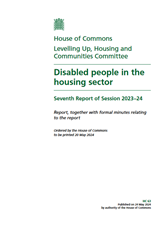Disabled people in the housing sector

This Department for Levelling Up, Housing and Communities (DLUHC) Select Committee report found that despite the cross-government effort to “ensure disability inclusion is a priority” there is little evidence that the government is treating disabled people’s needs as a priority in housing policy.
The report highlights, as an example, that almost two years since it was first announced, DLUHC has still not implemented its headline policy to address the shortage of accessible housing by increasing the minimum accessibility standard for all new build homes to the ‘M4(2)’ standard of building regulations. In its report, the Select Committee states:
- It is imperative that the Government’s M4(2) policy commitment is now implemented as soon as possible. If this is not done, then thousands of disabled people will continue to be left with their housing needs unmet. Accordingly, the Building Safety Regulator should launch the required technical consultation immediately with an expedited timeline.
In addition, the Committee makes a number of other important recommendations on the accessibility of new homes and undertaking adaptations of existing stock to make it accessible, including:
- Local authorities must do more to consider the needs of disabled people when planning for housing in their local plans. The Government must require all local authorities to assess their local need for wheelchair accessible housing, as part of future changes to national planning policy. All local plans in England should include a minimum percentage of M4(3) standard homes.
- The Government must require all local authorities to keep a register of accessibility of homes in their own housing stock and require local authorities to keep a detailed record of all accessible social housing within their local authority area. Local authorities should be encouraged to publish this information so that disabled people can access this information in appropriate accessible formats.
- The Government should immediately review the £30,000 upper limit on individual DFGs, with consideration for regional variation in construction costs, and set new regional upper limits. Going forward, the new upper limits must also take account of inflation and construction costs simplify the DFG means test and ensure it does not disproportionately penalise working disabled people by introducing more gradual tapering of personal contributions.
- The Government should also expand DFG guidance and self-assessment tools, to improve public awareness of the DFG and to support applicants as they navigate the process.
- The new Private Rented Sector Landlord Ombudsman must consider all complaints involving a landlord’s refusal to grant permission for accessibility adaptations, so that landlords are required to agree to all reasonable accessibility adaptations.
And, ultimately, the Select Committee explains that the key to tackling England’s housing crisis is to build more homes, including 90,000 new social rent homes per year, and more accessible homes.
The Housing LIN is proud to be a founding member offers Homes Made for Everyone (HoME) Coalition championing improved accessibility and housing rights for people with disabilities.
